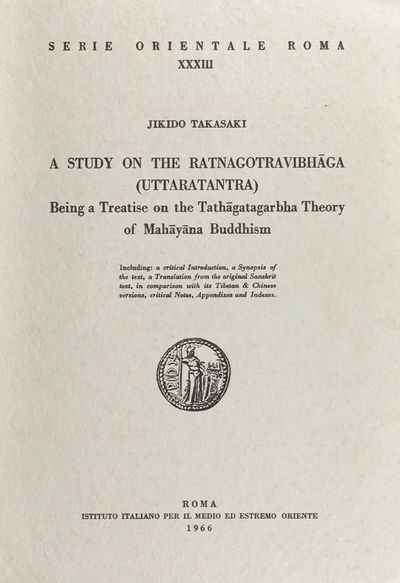- List of Abbreviationsix
- Prefacexi
- Introduction1
- I. The Ratnagotravibhāga, its Text, Translation, and Traditions concering the Author5
- 1. Text5
- 2. Translations & Traditions concerning the Author6
- II. The Structure of the Text10
- 1. Basic Text and Commentary10
- 2. Chinese Account of the Basic Verses12
- 3. Supposed Form of the Original Text18
- 4. The Commentary and Later Additions19
- III. Keypoint of the Discourse20
- 1. Ratnagotra, the Germ of the Three Jewels20
- 2. 4 Aspects of the Germ23
- 3. The Absolute26
- IV. Genealogy of the Tathāgatagarbha Theory32
- 1. Sources of the Ratnagotravibhāga32
- 2. Cittaprakrti and Āganutukakleśa34
- 3. Buddhajñana in the Avatamsaka35
- 4. The Tathāgatagarbhasūtra36
- 5. The Āryaśrīmālāsūtra37
- 6. The Anūnatvâpūrnatvanirdeśa and the Mahāparinirvānasūtra39
- 7. The Mahāyānasūtrâlankāra40
- V. Works on the Tathāgatagarbha Theory Contemporary with or Succeeding
the Ratna.45- 1. The Mahāyanadharmadhātvaviśesaśāstra45
- 2. The Buddhagotraśastra47
- 3. The Anuttarâśrayasūtra49
- 4. The Lankāvatāra and the Mahāyānaśraddhôtpādaśāstra53
- VI. The Position of the Ratna. in Mahāyāna Buddhism54
- 1. The Ratna. as a Criticism on the Prajñāpāramitā54
- 2. The Ratna. and the Vijñānavāda57
- 3. Consideration on the Date and Authorship of the Ratna.61
- I. The Ratnagotravibhāga, its Text, Translation, and Traditions concering the Author5
- Synopsis of the Text63
- Translation and Notes135
- I. Introduction141
- 1) The Meaning of the Adamantine Subjects141
- 2) Authorities on the 7 Subjects 143
- 3) The Essential Character of the 7 Subjects146
- 4) The Inherent Connection among the 7 Subjects153
- II. The Jewel of the Buddha155
- 1) The eightfold Quality of the Buddhahood156
- 2) Reference to the Jñānâlokâlaṅkārasūtra159
- III. The Jewel of the Doctrine163
- 1) The Eightfold Quality of the Doctrine164
- 2) Nirodhasatya & Mārgasatya165
- 3) The Doctrine as the Truth of Extinction165
- 4) The Doctrine as the Truth of Path168
- IV. The Jewel of the Community172
- 1) Manner and Extent of Perception173
- a) Right Manner of Perception174
- b) Unlimited Extent of Perception175
- 2) Introspective Character of Bodhisattva’s Perception176
- 3) Superiority of Bodhisattva’s Community176
- 1) Manner and Extent of Perception173
- V. The 3 Jewels as Refuges180
- 1) 3 Refuges from the Empirical Standpoint180
- 2) The Doctrine and the Community are not the ultimate refuge181
- 3) Only the Buddha is the Refuge from the ultimate Standpoint184
- 4) The Meaning of the 3 Jewels185
- VI. The Germ of the 3 Jewels in 4 Aspects186
- 1) Inconceivability of the 4 Aspects188
- 2) The Germ as Cause and Conditions of the 3 Jewels in its 4 Aspects194
- VII. The Sermon: All Living Beings are possessed of the Tathāgatagarbha196
- VIII. Analysis of the Germ from 10 Points of View199
- (I) Svabhāva & (II) Hetu200
- 1) The Nature of the Essence of the Tathāgata200
- 2) Obstructions and Causes for Purification201
- (III) Phala & (IV) Karman207
- 1) The 4 Supreme Virtues as the Result of Purification208
- 2) Concordance between the 4 Supreme Virtues and the 4 Causes for Purification210
- 3) 4 Impediments to the Attainment of the Supreme Virtues214
- 4) Motives of the 4 Supreme Virtues218
- 4') The Unstable Nirvāṇa219
- 5) Functions of the Germ for its Purification221
- (V) Yoga225
- 1) The Union of the Germ to the Factors of its Purification225
- 2) The Union of the Germ to the Result of Purification227
- (VI) Vṛtti (Manifestation)229
- (VII) Avasthāprabheda (Different States of Manifestation)230
- (VIII) Sarvatraga (All-pervadingness)233
- (IX) Avikāra234
- (A) Unchangeability in the Impure State235
- 1) Unoriginated Character of the Innate Mind238
- 2) Indestructible Character of the Innate Mind241
- (B) Unchangeability in the Pure-and-impure State243
- 1) Pure Character and Impure Character of the Bodhisattva243
- 2) Defilements endowed with the Virtuous Root245
- 3) Bodhisattva’s Compassion — The Parable of a Householder246
- 4) Bodhisattva’s Perception of the Pure Mind248
- 5) ‘ Samsära ’ in the Case of Bodhisattva250
- 6) Bodhisattva in his 6th Stage250
- 7) The Pure and Impure State of the Bodhisattva in comparison with the Ordinary Being and the Buddha253
- (C) Unchangeability in the Perfectly Pure State256
- (A) Unchangeability in the Impure State235
- (X) Asaṃbheda258
- 1) Synonyms of the Essence of the Tathāgata259
- 2) The Point: Buddhahood is Nirvāṇa261
- 3) The Parable of Painters263
- 4) Similarity of the Buddhahood to the Sun265
- (I) Svabhāva & (II) Hetu200
- IX. The 9 Illustrations on the Germ covered with Defilements268
- 1) The 9 Illustrations according to the Tathāgatagarbhasūtra268
- 2) 9 Kinds of Defilements — the Impurities of the Mind277
- 3) Concordance between the 9 Illustrations and 9 Kinds of Defilements281
- 4) The threefold Nature of the Essence283
- a) Dharmakāya284
- b) Tathatā287
- c) Tathāgatagotra288
- Appendixes
- I. Supposed for of the Original Śloka-grantha393
- II. Corrections & Emendations to the Sanskrit Text396
- III. Description of the Ultimate Reality by Means of the Six Categories400
- Indexes
- 1. Index of Sanskrit Terms411
- 2. Index of Works, Authors & Schools437


